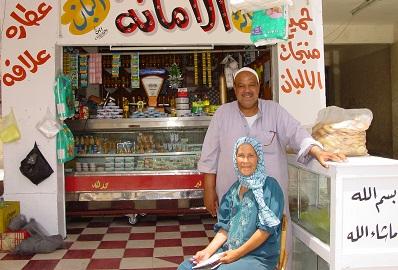Innovative Ideas to Solve Complex Social and Environmental Problems
by Chris Wellise, Director of Strategic Initiatives for HPE Living Progress

Arming women with the skills to build a more equal society. Providing marginalized expectant mothers with valuable health advice. Ensuring new entrepreneurs are set up for success. Preparing small and medium-sized businesses for disaster recovery. Ensuring that the free educational resources of the Internet are accessible to all.
These vital issues are being addressed by five winners of the proposal phase of the Living Progress Challenge. In part three of this series I shared ideas ranging from finding employment opportunities for marginalized people, to helping companies become more accessible to the disabled. Today, I want to share five more inspiring ideas that bridge the digital divide.
Impact Entrepreneurship by Consequential, Continuous Mentorship
Submitted by Endeavor
Entrepreneurs just starting out face many challenges—perhaps none as critical as a lack of access to senior management counsel and experience. The advice and support of seasoned professionals can make a huge difference to a start-up business.
The NGO Endeavor’s Living Progress Challenge concept is a web-based platform that will connect the next generation of high impact entrepreneurs with successful businesspeople who can become long-term mentors.
Entrepreneurs would build company profile pages on the Endeavor web platform that potential mentors could then evaluate. Each digital profile would integrate with Salesforce.com, enabling valuable metrics such as the company’s planned growth trajectory, to be captured. The tool would also enable entrepreneurs with complementary services to find each other.
Mentors would be able to browse the profiles and easily add comments, input information, link to resources, and more. By sharing their experience, knowledge, and professional expertise, volunteer mentors can help next generation leaders build thriving businesses and stronger communities.
Preparing Small and Medium Businesses Using Mobile Technology
Submitted by: Global Disaster Preparedness Center hosted by the American Red Cross
Each year, thousands of businesses in regions hit by natural disasters never recover and end up closing their doors forever. But the Global Disaster Preparedness Center, hosted by the American Red Cross, aims to change that. Its concept for the Living Progress Challenge is a mobile app that will inspire businesses to take simple steps to create a business continuity plan.
The mobile app will guide small business owners through a step-by-step process. It will assess their current situation; identify areas of improvement; and provide a suite of tools for their use. Leveraging the Red Cross/Red Crescent network of more than 60,000 branches around the world, the mobile app can be localized and adapted to many different cultures and languages.
Having a business continuity plan will enable businesses to become more resilient which has a positive cascading effect. The sooner they can get up and running after a disaster, the better the position they’ll be in to help their communities, and the faster whole regions can recover.
Sharing is Learning—Search, Discover and Remix Open Content
Submitted by: Institute for the Study of Knowledge Management in Education
There are tens of thousands of high quality, open education resources (OERs) available on the Internet. Yet the discovery and adaptation of those resources is denied to millions of people because they can’t be accessed by mobile apps.
The Sharing is Learning concept will help ensure true access for all by creating iOS and Android apps with a wide variety of features including low bandwidth options. It will enable educators to expertly curate high quality content by drawing from the digital public library, OER Commons. Its content collections will not only be free, but legally open to being remixed and distributed in any learning and social network. Selected course materials can be pre-loaded online for learners. Content will be searchable by subject, language, grade, common core alignment and more.
The tool will support on-the-go discovery and exploration of learning opportunities—opening up opportunity to millions.
Sheventures – A Gaming Platform for Women’s Advocacy Education
Submitted by: National Democratic Institute
Around the world, millions of women and girls are denied basic rights. Advocacy is often the only tool they have to fight oppression. Sheventures is a concept for an open narrative gaming platform designed to teach women and girls how to advocate for political, economic, social and institutional change in their communities.
The interactive adventures takes players on rich narrative journeys. Players can dive into an immersive world where they learn to tackle issues such as the gender wage gap, maternal health care and even human trafficking. Along the way, they’ll learn valuable organizing and advocacy lessons on how to make a difference in their communities.
The adventures within the game reflect real world examples based on the National Democratic Institute’s (NDI) decades of experience supporting global organizing. NDI will work with gaming experts who will assist in designing content that is compelling, challenging as well as educational. The platform is designed to be adaptable, growing easily to add new narratives and languages—ensuring that women all over the world are armed with the skills to build a more equal society.
Social Networks in Maternal Health Service Delivery (MoBy)
Submitted by: Jacaranda Health, Brigham and Women's Hospital, Harvard School of Public Health
Each year approximately 300,000 women die of pregnancy-related complications and more than 2 million babies die within their first week of life. Social Networks in Maternal Health Service Delivery (MoBy) is designed to tackle this tragic issue by improving health outcomes and quality of care for mothers and babies. How? By linking the power of social networking to maternal health systems.
Through this cloud-based tool, women will be able to join private, mobile chat-groups for mothers who are at a similar stage of pregnancy. It will then continue to guide them through postpartum and early parenting when support can be critical in safeguarding against health issues. An automated messaging platform will send information and general reminders to mothers about important subjects such as pregnancy and postpartum danger signs, breastfeeding and newborn care.
By tying social networking to maternal health sites and systems, the aim is to achieve improvements in pregnancy outcomes and quality of care around the world.
These are five of the inspiring and innovative proposals we received, all focused on using the power of technology to improve lives. Come back to this blog series to learn more about all our proposal phase winners.
Our final winners will be chosen August 3 at a live event in New York.

